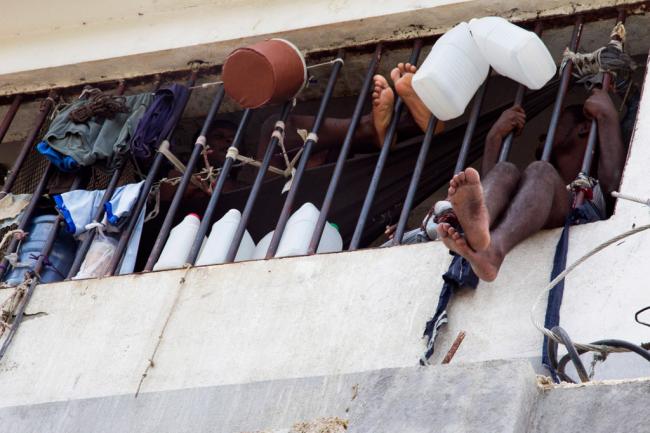
UN launches 'Nelson Mandela Rules' on improving treatment of prisoners
“The Secretary-General welcomes the revised rules and progress made,” said Ivan Šimonović, Assistant Secretary-General for Human Rights, who represented the UN chief at the high-level presentation at UN Headquarters of the revised Rules, named after the late South African President who spent years in prison. South Africa also chaired the Expert group in the revision of the Standard Minimum Rules.
“He notes the critical importance of protecting the human rights of all persons deprived of their liberty as one of the most vulnerable groups of individuals who risk abuse and ill-treatment,” Šimonović told those attending the event convened by the UN Office on Drugs and Crime (UNODC) and the Government of South Africa.
The senior human rights official highlighted as “important advances” the right to health of persons deprived of their liberty so that prisoners enjoy the same standard of health care as in the community and for continuity of treatment and care.
“This provision is very important because the risk of transmission of HIV and other infectious diseases is much higher in prisons than in the general population,” he said, adding that the new health rules also provide an absolute prohibition on torture and ill-treatment of prisoners.
Šimonović also welcomed the revised rules because they have “much more” specific provisions on solitary confinement, notably by defining solitary confinement as the confinement of prisoners for 22 hours or more a day without meaningful human contact; restricting the scope for application of solitary confinement; and defining prolonged solitary confinement as solitary confinement in excess of 15 days.
In addition, he noted the new rules provide for the first time guidance on intrusive searches, including strip and body cavity searches, and require the prison director to report, without delay, any custodial death, disappearance or serious injury and conduct a prompt, impartial and effective investigations into the circumstances and causes of such cases.
Šimonović, however, highlighted three areas where the revised rules could be strengthened from a human rights perspective.
“The first concerns the prohibition of discrimination,” he said, adding that he is “disappointed that sexual orientation and gender identity were not explicitly recognized as grounds for discrimination, given their recognition by most human rights treaty bodies.”
“There is substantial evidence of violence and mistreatment directed against gay, lesbian and transgender prisoners,” he said.
He also raised his concern over some of the language that is “at odds with terminology used by the Committee on the Rights of Persons with Disabilities,” and the recognition that some countries may legitimately imprison persons for debt,” in direct contradiction with article 11 of the International Covenant on Civil and Political Rights.
Šimonović expressed his sincere hope that the ‘Mandela rules’ will continue to be a work in progress, evolving over time to afford greater protection to detainees.
“That is what Mr. Mandela would have expected from us,” he said.
In his remarks, UN General Assembly President Mogens Lykketoft also recalled the spirit of Mandela, noting that the late leader emphasized: “It is said that no one truly knows a nation until one has been inside its jails. A nation should not be judged by how it treats its highest citizens, but its lowest ones.”
For his part, Lykketoft said that too often, in the past, nations have failed to protect the human rights of prisoners. Too often, the driving principle behind prisoner treatment has been to see these individuals as entirely separate from our communities and our societies.
He said, “Hidden from our gaze, and indeed sometimes before our very eyes, prisoners have suffered abuse and mistreatment.”
“After five years of consultations and negotiations, today we stand on the threshold of a shift away from such an outlook and a move towards a new standard for prison administration,” he said, explaining that the ‘Mandela Rules’ contain crucial revisions to the 60-year-old international standards on treatment of prisoners.
They outline that there shall be no discrimination; that the religious beliefs and moral precepts of prisoners shall be respected; and that legal representation and protection are mandated in regard to vulnerable groups within the prison populations.
“The crucial challenge for member states will be to translate these rules into a reality and to increase cooperation both within and outside the UN system to improve the lives of prisoners throughout the world,” said Lykketoft.
In his remarks, Oh Joon, the President of the UN Economic and Social Council (ECOSOC), said it is important to note that the revised Rules are part of much wider attempts to break the cycles of prison terms and recidivism.
Re-offending and a life of crime are often handed down from one generation to another, exacerbating poverty and marginalization in societies. Greater human rights, enhanced education, improved chances of rehabilitation can break these dangerous cycles.
“The Revised Standard Minimum Rules represent a significant progress in the treatment of prisoners. Our goal now is to translate these rules into a daily reality for prisoners everywhere,” he said, emphasizing that ECOSOC stands ready to work together in sending a clear message that the “high walls of prisons are not a bar to access to justice, and most importantly, to human rights.”
UN Photo/Victoria Hazou
Support Our Journalism
We cannot do without you.. your contribution supports unbiased journalism
IBNS is not driven by any ism- not wokeism, not racism, not skewed secularism, not hyper right-wing or left liberal ideals, nor by any hardline religious beliefs or hyper nationalism. We want to serve you good old objective news, as they are. We do not judge or preach. We let people decide for themselves. We only try to present factual and well-sourced news.







